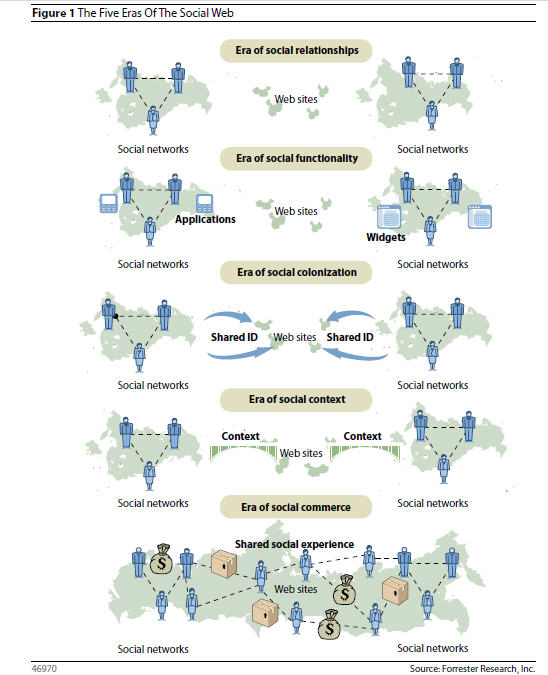Are social networks the next-gen commerce, CRM hubs?

The era of social commerce is on its way in the next two years and social networks are likely to become more powerful than corporate Web sites and customer relationship management software, according to a Forrester report.
The report, penned by Forrester analyst Jeremiah Owyang, examines five eras of the social Web. Owyang argues that the current social networking experience is disjointed since consumers have different identities on each site they visit. However, uniform IDs are coming---courtesy of OpenID and similar technologies---and that will transform marketing, e-commerce, CRM and advertising.
Here are the two money slides:
A look at the eras:
And the timeline:
Given that it's fairly obvious where social networking stands today---colonization (Facebook) meets context and ID sharing (even though my LinkedIn and Facebook identities remain different much to my chagrin). But let's fast forward to the commerce stage that's supposed to start in 2011. After all, someone has to make money off social networking at some point right?
Owyang argues the following points:
- Social networks have evolved into operating systems, but their reach is limited because their reach stops at the browser border.
- However, that's changing and communities will traverse the Internet. Exhibit A: OpenID. Facebook Connect is another example.
- Social networks will aggregate member activities and their networks and brands will move from traditional marketing to social recommendations.
- Search results will deliver content based on social relevance.
As those items (among others) fall in line this era of social commerce will begin. In this new world order, communities will group together for joint buys. Companies will listen to these communities, which wind up designing products. Add it all up and Owyang notes:
Social networks will become next-generation CRM systems. At first, we’ll continue to see vendors like Apprio pass small bits of user data to CRM systems like salesforce.com, but users will be reluctant to give full access to their data to brands they don’t trust. Eventually, social networks including Facebook, LinkedIn, and Twitter will include more sophisticated controls on which data customers wish to share with brands, earning consumer trust. As a result, these social networks will evolve into the holding ground of customer information. Social networks will derive power from a new role: a customer-relationship intermediary between brands and consumers.
And as registration pages go away and Web content becomes fragmented social networks will essentially become the hub of commerce.
Now all of this sounds completely feasible---until you remember that the Internet has historically whacked middlemen and intermediaries. If Owyang's plot is to be believed the Web will need "a customer-relationship intermediary," also known as an information middleman.
Owyang also acknowledges the privacy issue. Consumers may get a bit squeamish about this social commerce thing and may withdraw at some point. However, there is a bigger issue (data sharing). Owyang writes:
CRM and related revenue systems have evolved over decades to deliver the customer insights brands need. The data and technology infrastructure within a site like Facebook are designed to deliver experiences to consumers, not to integrate with marketers’ operational systems. If the future we’ve described is to come to pass, then social networks must devote major resources to technology foundations within the next few years to deliver a real-time, reliable, and secure environment for customer and brand information that integrates with marketer systems.
Although I'm sure there's a nice revenue model---maybe even data licensing---for Facebook here it's unclear whether consumers will want a social network being the de facto CRM snoop for a company. After all, everything in daily life can begin to look like a branding or sales exercise.
More reading: Deriving value from social networks
